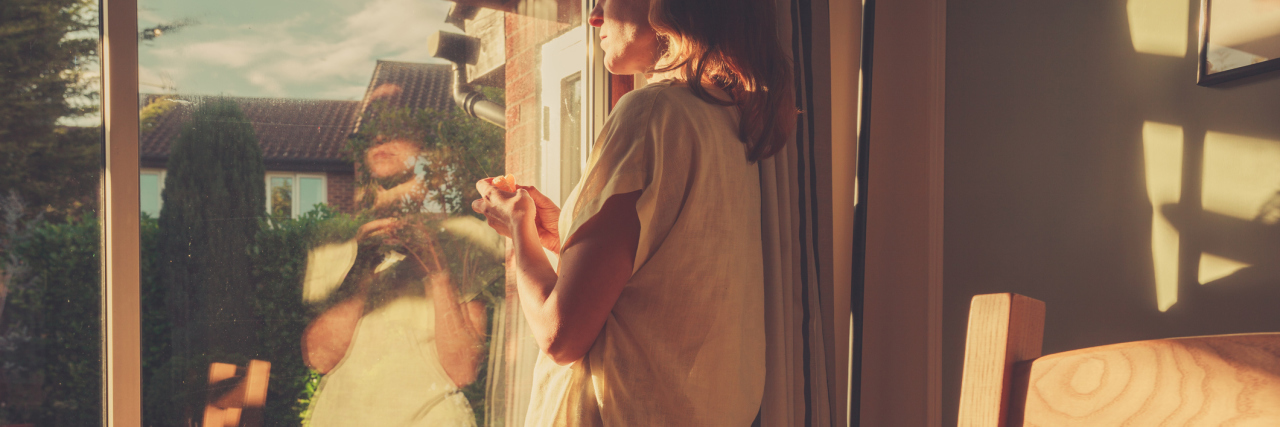It was late Thursday night. I don’t remember what I asked my psychiatrist the first time I called him that night. But I remember what I asked him the second time: “Where should I go if I don’t think I can make it to 8 a.m.?” It caught him off guard, but he gave me an inpatient program I could go to, and I told him to go back to sleep. An hour later, I put my car in park and walked in. I didn’t know if I was suicidal because I felt like if I was, then I would have just done it. But I wasn’t not suicidal — and my inability to distinguish how I was feeling was enough to have me admitted.
I had packed leggings and T-shirts, but not much else, not knowing what to expect. Intake took from 10 p.m. to 5 a.m. Aside from lots of questions and paperwork, they went through my stuff. I tried to explain I had changed medications and just needed to get through the night. I was tired. Dangerously tired. I had stopped taking one antidepressant and had done so cold turkey. I just needed to “stay safe.” I was just so tired.
They assigned me a room. My roommate was sound asleep, snoring. I curled up, not bothering to change, and closed my eyes. I didn’t want any of it to be real. I slept until after everyone had gone down to breakfast, then “snuck” out of my room to get some water and went right back in. I only came out for water and medication. The “psychiatrist” – an overworked D.O. who didn’t really listen to what I was saying, or just didn’t believe me, refused to release me on Friday. So I stayed in my room and went back to sleep, expecting to wake up the next morning — on Saturday — and be discharged.
And it turns out the psychiatrist wasn’t on call that weekend, so the earliest I would be able to get out was Monday. That’s when I lost it. I bawled my eyes out. That meant I was going to fail school. I had to way to get a hold of anyone — my life was going to fall apart, all because I tried to do the “right” thing and be “safe.” I was devastated. Everything was falling apart; this couldn’t be happening.
Finally, after not eating anything since I’d arrived, I went to dinner Saturday night. I tried to be friendly, hoping it would help me get out of there. But when we got back to the unit, I went back to my room and cried more. I didn’t eat Sunday, and I never participated in activities. Eventually, I did start sitting in the common area just outside my room to read, and stepped outside for “smoke break” time once or twice. I made jokes and tried to show I was fine, but inside I was a mess. Even when woken up at 5 a.m. for vitals, my heart rate was in the 100s, my blood pressure high.
On 8 a.m. Monday morning, the psychiatrist woke me up. “So you’re refusing to try new medication, despite being suicidal when you got here?” Yep. “Ok, let’s get you out of here.” A few hours later, I was discharged. I went home. I ate. I showered. I slept. I talked to my psychiatrist, my therapist, my cardiologist. I tried to catch up on school work. I tried to pick up the piece of my life that had shattered that weekend.
It wasn’t as hard as I thought. Life continued on and I managed to salvage all those things I thought were destroyed. But when the dust settled, I realized nothing had changed. I was just as depressed as when I went in. Just as tired. Less suicidal, but that was just a matter of time and detoxing off the medication I had stopped. But nothing really changed.
I realized something about that place — it was a treatment facility. But I don’t need treatment — I need healing. I don’t need supervision, I need support. I don’t need rigid structure and safety checks, I need love and understanding.
So even though my weekend of inpatient treatment might not have changed anything, in a way it changed everything. I have to start healing if I ever truly want to feel well. And when I walked into my therapist’s office Wednesday morning, I told him “I think I’ve had enough ‘treatment’ for a lifetime — I want to heal.” And with a relieved smile, he told me he couldn’t agree more.
I hope I never end up back in a hospital for my mental health ever again, because all it did was make me feel broken and afraid. I realized, despite being on medication for depression and anxiety, my problem is not one of needing better treatment. I have the best psychiatrist in the world, and I trust him to handle that part. What I need is to heal from the pain I have denied exists — to heal from what others have done to me, and what I have done to myself. To heal from things I didn’t know were hurting, and the things I never knew could.
I need to heal, and that takes time. But now I understand — and now, I’m ready.
Editor’s note: Please see a doctor before starting or stopping a medication.
If you or someone you know needs help, visit our suicide prevention resources page.
If you need support right now, call the National Suicide Prevention Lifeline at 1-800-273-8255, the Trevor Project at 1-866-488-7386 or text “HOME” to 741-741. Head here for a list of crisis centers around the world.
We want to hear your story. Become a Mighty contributor here.
Thinkstock photo via lolostock

